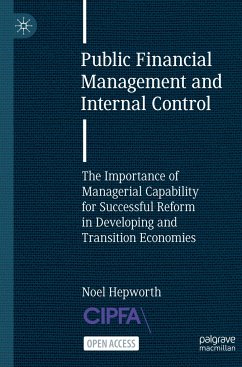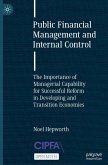This open access book focuses on the 'downstream' element of PFM, that is how public organisations utilise public resources. It argues that improvements in PFM/IC will only flow from a recognition that what really matters is the quality of management. Management reform is an essential precondition to the successful implementation of many new techniques. Only when a managerial capacity exists willing to take advantage of the opportunities created by such technical developments, is it beneficial to pursue them. The benefits of PFM/IC flow from an improved quality of management.
Despite enormous efforts, reform of public financial management and internal control (PFM/IC) in developing and transition economy countries has not been particularly successful in improving the quality of public service delivery and the use of public resources. This book outlines why this is and suggests a new approach. The analysis set out in this book is particularly relevant especially given limited national budgets and squeezed international aid budgets.
These management changes include to the political/official relationships, to management structures, to budgetary and accounting arrangements and to the relationships between, particularly, the ministry of finance and other ministries. They require the delegation of operational management, developments in financial management and in accountability arrangements and a reconsideration of personnel policies, penalty and sanction arrangements. Managerial training for the civil service will be a key requirement. Reform may impact upon traditional cultural practices. These changes are all inter-related and should be coordinated.
Despite enormous efforts, reform of public financial management and internal control (PFM/IC) in developing and transition economy countries has not been particularly successful in improving the quality of public service delivery and the use of public resources. This book outlines why this is and suggests a new approach. The analysis set out in this book is particularly relevant especially given limited national budgets and squeezed international aid budgets.
These management changes include to the political/official relationships, to management structures, to budgetary and accounting arrangements and to the relationships between, particularly, the ministry of finance and other ministries. They require the delegation of operational management, developments in financial management and in accountability arrangements and a reconsideration of personnel policies, penalty and sanction arrangements. Managerial training for the civil service will be a key requirement. Reform may impact upon traditional cultural practices. These changes are all inter-related and should be coordinated.








